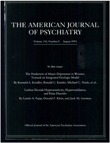Clinical phenomenology and neurobiology of cocaine abstinence: a prospective inpatient study
Abstract
OBJECTIVE: This study was undertaken to document symptoms and changes in dopaminergic function emerging after abrupt cessation of cocaine use. METHOD: After admission, 22 patients with DSM-III-R cocaine dependence were observed drug free for 3 weeks. The patient-rated Ribicoff Abstinence Rating Scale, Symptom Rating Scale, Physical Symptom Scale, Patient Rated Anxiety Scale, Beck Depression Inventory, and visual analogue scales for 16 subjective states were completed daily, and nurses rated 13 patients with the global anxiety and depression items of the Short Clinical Rating Scale. Serial blood samples were obtained three times weekly, and the patients' levels of prolactin, growth hormone (GH), and homovanillic acid (HVA) were measured. Their prolactin and GH values were compared with those of matched normal subjects. RESULTS: A total of 62 subjective symptom variables were evaluated. At baseline, the symptom ratings were mildly elevated. At 3 weeks there were significant decreases from baseline in 28 variables and nearly significant decreases in six additional variables. Nurse-rated anxiety and depression also changed, but in a more variable pattern. There was a small but significant increase from baseline over time in plasma prolactin, but there were no significant changes in GH or HVA. The patients' prolactin and GH values did not differ from those of the normal subjects. CONCLUSIONS: These findings suggest that symptoms after inpatient cessation of uncomplicated cocaine addiction are relatively mild and decrease linearly over the first month. Evidence of dysregulated central dopamine function was limited. The findings do not support routine use of pharmacological agents in the inpatient management of such patients.
Access content
To read the fulltext, please use one of the options below to sign in or purchase access.- Personal login
- Institutional Login
- Sign in via OpenAthens
- Register for access
-
Please login/register if you wish to pair your device and check access availability.
Not a subscriber?
PsychiatryOnline subscription options offer access to the DSM-5 library, books, journals, CME, and patient resources. This all-in-one virtual library provides psychiatrists and mental health professionals with key resources for diagnosis, treatment, research, and professional development.
Need more help? PsychiatryOnline Customer Service may be reached by emailing [email protected] or by calling 800-368-5777 (in the U.S.) or 703-907-7322 (outside the U.S.).



